
Kelsey Martin, APRN, AG-ACNP-BC, AOCNP, discusses current ADCs in breast, bladder, and lung cancer and highlights promising agents in development.

Kelsey Martin, APRN, AG-ACNP-BC, AOCNP, discusses current ADCs in breast, bladder, and lung cancer and highlights promising agents in development.

Melissa Rikal, MSN, FNP-BC, AOCNP, shares strategies to help nurses improve adherence and patient education for oral oncolytic therapies.

Nurse practitioner Beth Faiman outlines nursing strategies to monitor, assess, and manage toxicities associated with talquetamab in multiple myeloma.
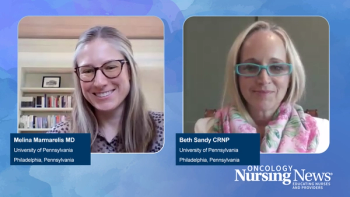
Panelists discuss how they guide first-line ALK inhibitor selection based on efficacy, tolerability, clinical data, and patient-specific considerations.

Panelists discuss how they prepare patients for ALK inhibitor therapy following a confirmed ALK-positive result.

Melissa Rikal, MSN, FNP-BC, AOCNP, explained that adverse effects are common among the available antibody-drug conjugates in breast cancer.
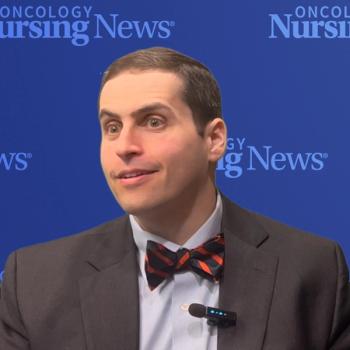
David A. Braun, MD, PhD, explained that personalized cancer vaccines can be associated with toxicities typical of both vaccines and immunotherapies.

Panelists discuss how strategic nursing coordination and effective communication support timely and comprehensive biomarker testing for newly diagnosed NSCLC patients.

Panelists discuss how evolving clinical advances and biomarker-driven therapies have transformed treatment practices and outcomes for patients with ALK+ NSCLC.

Michelle Kirschner, MSN, RN, ACNP, APRN-BC, explains how educating patients about the Breast Cancer Index can support informed endocrine therapy decisions.

Treatment decisions for older adults after CDK4/6 inhibitors should be tailored, explained Courtney Moore, APRN, FNP-C, OCN.
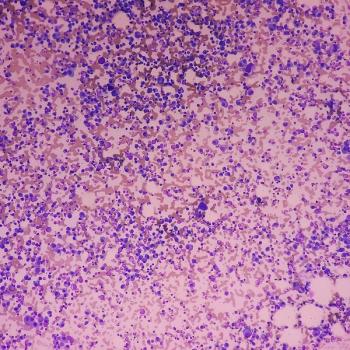
Experts outline AE risks—including ICANS, CRS, HLH—as T-cell engager use expands, highlighting the crucial role of nurses and APPs.

Subcutaneous daratumumab offers shorter clinic visits and high tolerability for patients with multiple myeloma, says Stephanie Mompoint, APRN.

Ronald Bleday, MD, explained that a model to reduce opioid use in patients after colorectal surgery relies on nurses familiar with the relevant surgeries.
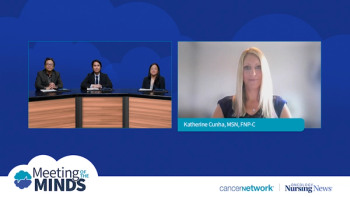
Panelists discuss how dose modifications for ALK inhibitors can significantly improve quality-of-life issues such as brain fog and weight gain while maintaining disease control, emphasizing the importance of multidisciplinary team support, including palliative care from diagnosis.
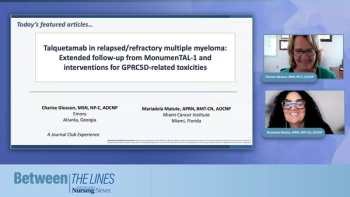
Panelists discuss that shifting talquetamab dosing from weekly to every 2 weeks improves response durability and patient quality of life, while emphasizing that temporary treatment holds due to adverse effects are manageable, and ongoing research is vital to address unmet needs and advance multiple myeloma care.

Panelists discuss that the phase 2 TALISMAN trial evaluated prophylactic strategies to prevent severe oral toxicities with talquetamab, highlighting the importance of early patient education, multidisciplinary management, and nutritional support to optimize care and maintain quality of life.

For patients with HR-positive breast cancer, adverse effects vary by CDK4/6 inhibitor, says Courtney Moore, APRN, FNP-C, OCN.

Kimberly Podsada, BSN, RN, MSN, NP-C, CNS, explained that understanding a patient’s emotional needs can help educate them on treatment adherence.
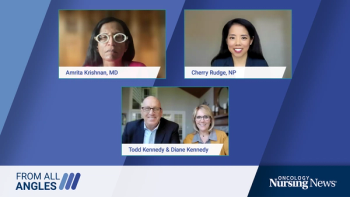
Panelists emphasize the importance of multidisciplinary collaboration, patient education, and advocacy in managing multiple myeloma while expressing optimism about emerging therapies like CAR T cells that offer deeper remissions and improved quality of life.

Panelists highlight advances in myeloma treatment, focusing on innovative T cell therapies like CAR T and T-cell engagers, along with potent new CELMoD drugs, all offering more targeted and effective options for patients.

Panelists discuss City of Hope’s collaborative partnership with community physicians, emphasizing expert evaluation at specialized centers while enabling ongoing treatment closer to home for convenience, coordinating common therapies like Daratumumab locally, reserving complex procedures such as stem cell transplants and clinical trials for specialized centers, and aiming to balance high-quality care with patient accessibility through integrated, personalized, and coordinated management across care settings.

Survivorship expert Michelle Kirschner, MSN, RN, ACNP, APRN-BC, says that “doable changes” can enhance the lives of patients surviving cancer.
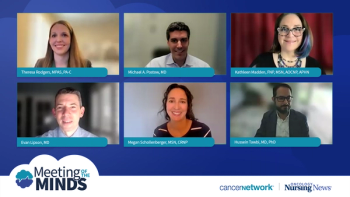
Panelists discuss the importance of effective communication and multidisciplinary collaboration in managing immunotherapy toxicities and ensuring seamless patient care, while highlighting promising advances in melanoma treatment and the role of telehealth and community outreach in expanding access and improving outcomes.

Panelists discuss the complexities of managing metastatic melanoma with asymptomatic brain metastases in patients with good performance status, emphasizing challenges posed by treatment resistance and highlighting emerging therapies—such as genetically modified T cells, bispecific T-cell engagers, and intralesional oncolytic viruses—that aim to improve durable outcomes in advanced disease.

This is an actor portrayal of a hypothetical patient profile developed for educational purposes based on characteristics of patients with multiple myeloma as seen in clinical practice. The hypothetical case was co-developed by staff Medical Writers with Cancer Network/ONN.

Experienced oncology nurses and APPs can help nurses newer to the field understand who is more at risk of opioid addiction, says expert Ronald Bleday, MD.

Panelists discuss how proactive monitoring for ALK inhibitor adverse effects through regular lipid panels, liver function tests, and patient education about red flag symptoms such as bradycardia or cognitive changes enables early intervention and successful dose management.

Panelists discuss how the unprecedented 5-year progression-free survival benefit (60% vs 8%) demonstrated in the CROWN trial supports starting with the most effective treatment (lorlatinib) up front rather than sequential therapy approaches.

Panelists discuss that talquetamab dose modifications are guided primarily by patient symptoms and adverse effects, with treatment pauses for significant toxicities or infections, while response monitoring relies on regular myeloma labs, imaging, and physical exams to ensure safety and efficacy.